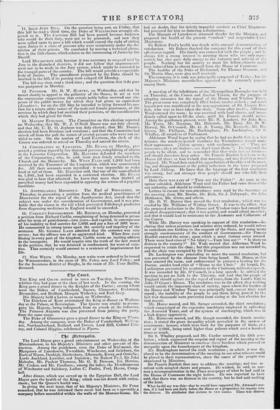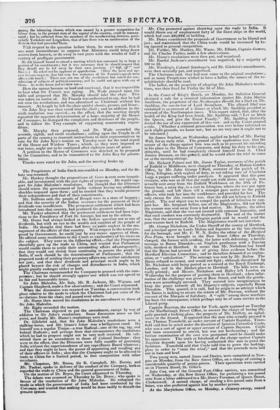A meeting of the inhabitants of the Metropolitan Boroughs was
held on Thursday, at the Crown and Anchor Tavern, for the purpose of adopting measures for the repeal of the House and Window Taxes. The great room was completely filled before twelve o'clock ; and ninth impatience was manifested at the non-appearance of Sir Francis Bur- dett, who Ives to have taken the chair. Soon after twelve, Alderman Wood entered the room : he was received with loud cheers, and imme- diately called upon to fill the chair, until Sir Francis should arrive. Among the gentlemen present, were Mr. N. Lambert, Sir John Key, Mr. Tynte' Mr. Bayntun, Mr. Halcomb, Mr. Byng, Mr. D. W. Harvey, Mr. O'Connell, Mr. G. A. Young, Mr. Kennedy, Mr. Ru- binson, Mr. Phillpots, Mr. Buckingham, Dr. Lushington, Sir e: • Whalley, all members of Parliament. Alderman Wood began by saying that he had no doubt that in a fey; minutes the much-respected members for Westminster would make their appearance. [Great uproar; with exclamations of •‘ They are turncoats—they are traitors—we don't want them."] He implored the people to be silent, and to remember that they were met on business, and should therefore keep order. Sir Francis Burdett lied Leen in the House till three or four o'clock that morning, and was doubtless much fatigued. 111.r: Wood then stated his approbation of the object of the meet- ing, and disappointment at the paltry reduction in the taxes proposed by Lord Althorp. He knew that the language of the first resolution was strong, but not stronger than people should use who felt their
grievances. • Here there was a cry of " Turn out the Police !" As soon as the uproar subsided, Alderman Wood said the Police had come therewith- out authority, and should be withdrawn.
Letters in excuse for non-attendance were read by the Secretary of the meeting, from Mr. Brodie, Mr. Bish, Sir J. Dalrymple, Sir joint Hobhouse, Mr. Grote, and others.
Mr. D. W. Harvey then moved the first resolution ; which was se- conded by Mr. Williams of Watling Street. It was to the effect, that the proposed reduction in the House and Window taxes had caused the greatest disappointment ; that it was partial, and would afford no relief; and that it would lead to resistance to the Assessors and Collectors of the Crown.
While Mr. Harvey was speaking in support of this resolution—de- claring that -unless pensions and salaries were reduced, he would refuse to contribute one farthing to the support of the State, and using terms strongly condemnatory of the conduct of Government—Sir Francis Burdett entered the room ; upon which a most riotous scene ensued There were loud cries of " No Glory !—Turn him out !" " Is there no distress in the country?" Dr. Wade moved that Alderman Wood be requested to retain the chair; but this proposition was not attended to, and the chair was occupied by Sir Francis.
Dr. Lushington was proceeding to move the second resolution, but was prevented by the clamour from being heard. Mr. Hume, at this time entered the room, and endeavoured to procure a hearing for the Doctor, amidst loud cries of " Hume to the Chair." At length, Dr. Lushington presented his resolution to the Chairman, without a speech. It was seconded by Mr. O'Connell, in a long speech : he advised the meeting to put no faith iu the Ministry, and said that the people of England should agitate for the repeal of taxes, from the Land's End to John O'Groat's House. The resolution was to the effect, that nothing would satisfy the important class of society, upon whom the burden of the House and Window Taxes was principally laid, except their total repeal ; the inability of the people to pay them, being proved by the fact that thousands were prevented from voting at the last election for that reason.
Mr. Hume moved, and Mr. Savage seconded, the third resolution ; which complained of the expensive machinery employed in collecting the Assessed Taxes, and of the system of surcharging, which was in a high degree oppressive. Mr. Robinson moved, and Mr. Gough seconded, the fourth resolu- tion ; it stated the gross inequality which prevailed in the system of assessment; houses, which were built for the purposes of trade, at a cost of 2,000/., being rated higher than palaces which cost a hundred times as much.
Sir S. Whalley proposed, and Mr. Corder seconded, the fifth reso- lution ; which expressed the surprise and regret of the meeting at the determination of Ministers to continue these hardens which pressed so unequally upon the housekeepers of the kingdom.
Mr. Buckingham moved the sixth resolution ; in which it was de- clared to be the determination of the meeting to see what reliance could be placed in their representatives, since the cause of the people was abandoned by Ministers.
Sir Francis Burdett then rose to address the meeting; and was re- ceived with mingled cheers and groans. He wished, he said, to cor- rect a misrepresentation in the Times newspaper of what he had said in the House of Commons the night before. He was reported to have said,-that there was no distress in the country, but he had said nothing of the kind.
What he did say was this—that he would have supported 1111. AttwoOd's mo- tion, if it had been .put fairly before the House as a proposition for inquiry into the distress. He attributed that distress to two causes. There was distress .sarong the labouring classes, which was caused by a greater competition for labour than, in the present state of the capital of the country, could be remune- rated ; but he collected from the members of the maufacturing districts, parti- cularly Yorkshire and Laqrashire, that of late there was an amelioration of the di,tress that had prevaileatere.
• • With respect to the question before them, he must remark, that it was most inconsiderate to suppose that Ministers could bring down manna from heaven, or do away in two years with the results of half a century of profligate government.
He felt himself bound to attend a meeting which was convened by so large a portion of his constituents; but it was necessary that he should request that they should not be led away by their own passions. (" Offi Or!" and hisses.) He asked not for applause or approbation. I Here the. noise and up- roar became so great, that but very few sentences of Sir Francis's speech were afterwards heard.j There was not one of the resolutions but raised the con- sideration of subjects of political economy, and lie could not agree with any of them.- As to the house and wiidow tax— Here the uproar became so loud and continual, that it was impossible to hear what Sir. Francis was saying. Dr. Wade jumped upon the table and proposed that Mr. Murphy should take the chair. This was taken no notice of and Francis was unlierstood to say, that he had not seen the resolutions, and was advertised as Chairman without his consent. At length he left the chair amidst shouts, groans, and hisses. Sir John Key was then voted into the chair ; and an addition to the sixth resolution was carried,—to the effect, that the meeting deeply regretted the apparent determination of a large majority of the House of Commons, to disregard the complaints and distresses of the people, and to follow the Tory example of supporting unnecessary expen- diture.
Mr. Murphy then proposed, and Dr. Wade seconded the seventh, eighth, and ninth resolutions ; calling upon the People in all parts of the country to transmit instructions to their representatives to vote for Sir John Key's motion on Tuesday next for the total repeal of the House and Window Taxes ; which, as they were imposed as war taxes, ought not to be continued after eighteen years of peace. A petition to the House of Commons was directed to be prepared by the Committee, and to be transmitted to Sir John Key for presen- tation.
Thanks were voted to Sir John, and the meeting broke up.























 Previous page
Previous page